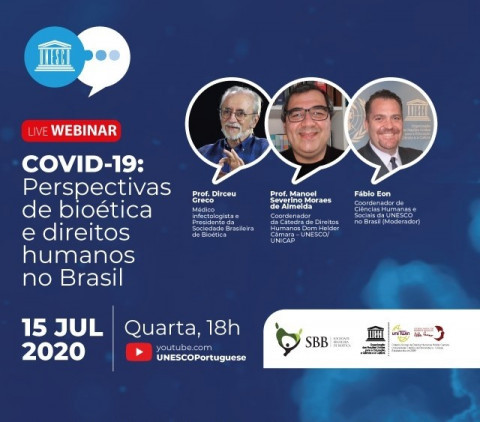
GCED Basic Search Form
Quick Search
You are here
News

Webinar promoted by UNESCO in partnership with partner entities discussed on the implications of bioethics and human rights in times of pandemic
UNESCO in Brazil, in partnership with the Brazilian Society of Bioethics (SBB) and the UNESCO Chair in Human Rights Dom Hélder Câmara (UNESCO / UNICAP), held yesterday (15) the webinar "Perspectives of bioethics and human rights in Brazil", also broadcast live (also in Libras) by the City Council of Campinas. The virtual meeting aimed to discuss the implications of the COVID-19 pandemic on this topic, especially amid a crisis in which social inequalities in the country are becoming even more evident. The coordinator of Humanities and Social Sciences of UNESCO in Brazil, Fábio Eon, participated in the meeting as a moderator. The debate also had the participation of the infectious disease physician and president of SBB, Prof. Dirceu Greco, the coordinator of the Dom Helder Chair for Human Rights (UNESCO / UNICAP), Prof. Manoel Severino Moraes de Almeida.
The webinar was held at the moment when Brazil reaches the mark of 75 thousand victims of COVID-19 and faces numerous challenges as a result of this crisis, such as the increase in cases of domestic violence, the fight against misinformation and fake news and the difficulties in guaranteeing access to education and culture for all. According to the president of SBB, Dirceu Greco, the COVID-19 pandemic highlighted, even more, the social inequalities faced by the country: “the pandemic is opening up social, political and health deficiencies, in addition to exposing the disharmonious relationship between man and the environment environment".
The debate also addressed the delicate situation faced by the most vulnerable groups, such as indigenous populations and refugees, in addition to the need to strengthen and improve the Unified Health System (SUS) in Brazil. For Manoel de Almeida, ensuring access to health for these groups is a duty of the State. "We have several challenges concerning indigenous communities, such as the lack of assistance and the lack of State policies", he said.
At the end of the meeting, participants expressed their opinions regarding expectations about the post-pandemic world. According to Fábio Eon, this will be a moment of opportunity and possibilities for the construction of a new civilizing pact: “the pandemic will leave us as a legacy the importance of rethinking our notion of humanity and solidarity and will probably reinforce the role of multilateral cooperation in facing global problems”.
The webinar "Perspectives of bioethics and human rights in Brazil" had the active participation of Internet users and can be fully accessed through the UNESCO Portuguese YouTube channel.
URL:
